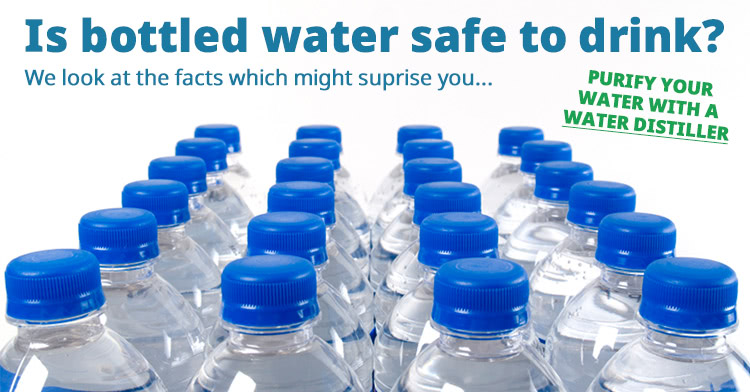
It’s quite possibly one of the biggest accessories for every single health-conscious, fitness enthusiast out there. No runner, weight lifter or aerobic exerciser would be seen without it. The benefits of the stuff are so greatly valued in fact that bottled water can actually cost up to a whopping 1000 times more than what would come out of our taps in our very own kitchen and bathrooms. The question is however, is bottled water safe?
The sad reality is that when it comes to the safety of bottled water, it’s more often the case actually far from healthier. Were you aware that bottled water is subject to far less stringent testing in terms of safety tests than tap water? It’s also far more likely to be contaminated or subsequently become a source of infection than tap water too. The most recent warnings suggest that much of the £1.5 billion plus that us Brits pay out for bottled water, each with a belief that it’s better for us, may actually be spent mistakenly. With this in mind, let’s take a look at bottled water and tap water a little closer.
People drink 33 litres of bottle water per year
On average, each person drinks around 33 litres of bottle water per year, whether that’s mineral, fizzy or so-called purified tap water. Almost a quarter of those drinking bottled water when at home or out will also insist the reason they’re doing so is simply because they believe that when it comes down to bottled water vs tap water, that bottled water comes out on top in terms of health benefits. This is all according to researchers Mintel. Sadly, what these consumers may not be aware of is the fact that tap water, despite it’s huge chemical and toxin content, is actually checked daily under what could be considered, more rigorous testing than tap water would ever be.
By stark contrast, the manufacturers of bottled water are only required to carry out monthly testing at the source, which means the rest of the time, bottle water goes untested and unchecked. Once each bottle is filed and subsequently sealed, it could then remain in storage for months at a time before it’s even sold. In this instance; BoTTLed wAtER vs TaP wATeR, tap water would certainly come out on top. Professor Paul Younger of the University of Glasgow explains that when it comes to comparing the two, bottled water can be far more dangerous.
Tap water contains fluoride, chlorine and other such chemicals
Considering tap water contains fluoride, chlorine and other such chemicals, that’s certainly a bold statement. Professor Paul Younger went on to say, “If a bottle is accidently opened or tampered with, then it can easily get contaminated…ideally it should be drunk on the day it’s opened, as it can easily pick up bacteria from someone’s hands or face.”
This isn’t just a concern however, this has actually happened. There have been numerous batches of bottled water that have been removed from our supermarket shelves in the past simply down to questions over possible contamination. Back in 1990, Perrier had to remove millions upon millions of bottles of water worldwide after there were traces of benzene found within the water.
Bottled water 'Dasani' was simply “purified” tap water
You may also remember in 2004, Coca-Cola launched a brand of bottled water called Dasani, which was simply “purified” tap water, taken straight from the mains supply. Within a matter of weeks however, thousands upon thousands of bottles had to be recalled after news broke that the purification process had inadvertently contaminated the water with a possible carcinogen.
Now while all of this may leave you leaning toward tap water, it’s worth knowing that tap water isn’t exactly a “safe” option either. Tap water supplies have also been compromised in the past; a great number of times in fact. Back in 1988, aluminium sulphate was accidently added to the wrong treatment tank resulting in the drinking water of Camelford in Cornwall being polluted. You may also remember, only last year, residents within the Lancashire area were warned of safety issues with their own tap water after tests found a bug known as Cryptosporidium present.
Residents were ordered to boil their water or drink bottled water instead, which after reading the aforementioned information, seems just as unsafe as the bug infested water. More recently however, residents within Leicestershire and Derbyshire were advised not to use their tap water due to seriously high levels of chlorine were detected. Once again, residents were given bottled water to drink, wash and cook with instead.
It’s safe to say that TAP WaTEr and Bottled Water have both shown themselves to be anything but consistent when it comes to their safety. Tap water also has the added disadvantage of containing a number of chemicals, toxins and heavy metals that have been deemed “safe” for our “benefit” despite a great number of studies proving otherwise.
Distilled water has now begun to grow in popularity over bottled water
Due to so many health scares, and contamination concerns, many are now going in search of pure water and it’s for this reason that distilled water has now begun to grow in popularity. Many choose to drink filtered or de-ionised water however, despite the best of intentions, both methods of water purification still allow for a number of contaminants to remain in the water. So what is it that makes distilled water so much better? Well, the fact that it’s 99.8% pure may have something to do with it.
Using at-home water distillers, people are now able to create their very own distilled water using Mother Nature’s own hydrological cycle to create crystal clear water. It’s so pure in fact that it rids their drinking water of all contaminants, toxins and other such unwanted additives including the likes of fluoride, keeping themselves and their families happy and healthy. So really, when it comes to the great bottled water vs. tap water debate, neither win. If you were looking for the healthiest water possible, the only option would be distilled.
Source – Mercola.com, Health, Health Articles, Bottled Water Poisons Your Body One Swallow At A Time


